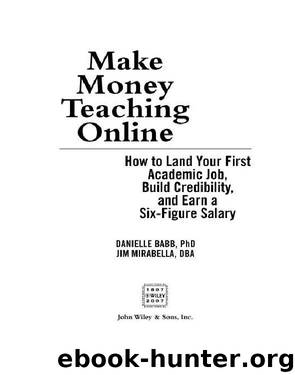Make Money Teaching Online by Babb Danielle & Mirabella Jim

Author:Babb, Danielle & Mirabella, Jim
Language: eng
Format: epub
Publisher: Wiley
Published: 2010-12-22T16:00:00+00:00
Nontraditional Universities and Community Colleges
The two don’t seem to fit together, but they do in more ways than you might think.Yes, community colleges have traditional daytime students and full-time faculty and real campuses and standard semesters, while nontraditional universities often have no full-time faculty, all adult students, and mostly night/weekend classes, and work out of an office building. What these institutions do have in common, though, is that they often have open enrollment with no limit on the number of students they admit, and they both reach out to adult learners. As such, they are always hiring online faculty. As we discuss in this book, you need to get your applications to the right people up front, and if they are interested in you, they may fast-track you.
Often the process for interviewing is quick because the school doesn’t have the manpower to go through a formal process with every applicant. You will probably receive a phone call from a single person, probably the department chair or dean, and he or she will ask a few key questions about your skills, your background, your availability, and your flexibility, and will then give you a chance to ask questions. You may be asked specifically about your online teaching experience and whether you’ve used the school’s platform, which is its online classroom system (discussed in Chapter 9 in greater detail).You can use this as an opportunity to find out more about the university, the pay, the commitment required of online professors, and how scheduling works. If you hit it off, you can expect to advance to the next round—training—rather quickly.
The big-name traditional universities seldom have this formal training because they don’t hire faculty with great regularity, but these open enrollment programs tend to take hundreds of applications each week and select a small percentage for consideration. Don’t take it too lightly; the training itself is part of the interview process.Your e-mail and written correspondence as well as your verbal skills on the phone are being evaluated, but it is when you participate in the standard online training that you are truly being interviewed, albeit very subtly. This is the area where many potential faculty members are weeded out; they essentially waste many weeks of their time in training only to never be offered a position.
The training courses usually include one on the Web platform and another on general university policies, and sometimes another on the proper way to teach online (i.e., doing things the university way). Sometimes these training modules are rolled up into one or two courses, if you are lucky. One of the established faculty members (sometimes an adjunct) facilitates the course, and you must participate like a real student in a real course. This means full participation—if the school requires five days per week of participation, then you must be there five days per week.You are actually graded on your written assignments, your timeliness, your online courtesy, your ability to work in groups, and whether you fit into the culture of the university.
Download
This site does not store any files on its server. We only index and link to content provided by other sites. Please contact the content providers to delete copyright contents if any and email us, we'll remove relevant links or contents immediately.
Rich Dad Poor Dad by Robert T. Kiyosaki(6632)
Pioneering Portfolio Management by David F. Swensen(6300)
How To Win Friends and Influence People by Dale Carnegie(4512)
The Money Culture by Michael Lewis(4207)
The Dhandho Investor by Mohnish Pabrai(3764)
The Wisdom of Finance by Mihir Desai(3746)
Liar's Poker by Michael Lewis(3447)
Fooled by Randomness: The Hidden Role of Chance in Life and in the Markets by Nassim Nicholas Taleb(3123)
The ONE Thing by Gary Keller(3071)
Mastering Bitcoin: Programming the Open Blockchain by Andreas M. Antonopoulos(3041)
The Intelligent Investor by Benjamin Graham Jason Zweig(3039)
The Psychology of Money by Morgan Housel(3034)
Rich Dad Poor Dad: What The Rich Teach Their Kids About Money - That The Poor And Middle Class Do Not! by Robert T. Kiyosaki(2958)
Investing For Dummies by Eric Tyson(2952)
How to Day Trade for a Living: Tools, Tactics, Money Management, Discipline and Trading Psychology by Andrew Aziz(2949)
How to Win Friends and Influence People by Dale Carnegie(2914)
Market Wizards by Jack D. Schwager(2700)
How to Pay Zero Taxes, 2018 by Jeff A. Schnepper(2655)
Zero Hour by Harry S. Dent Jr. & Andrew Pancholi(2647)
